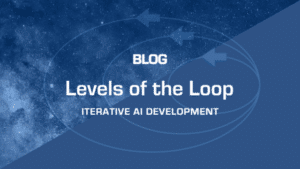The concept of determinism plays a pivotal role in shaping  how we develop, deploy, and trust AI systems. At Jaxon, we’ve been leveraging determinism as a central tenet of creating robust and reliable AI solutions that lean on symbolic reasoning for the rigor many of our customers demand.
how we develop, deploy, and trust AI systems. At Jaxon, we’ve been leveraging determinism as a central tenet of creating robust and reliable AI solutions that lean on symbolic reasoning for the rigor many of our customers demand.
What is Determinism in AI?
Determinism in AI refers to the predictability and reproducibility of an AI system’s behavior and outputs based on given inputs. In simple terms, a deterministic AI algorithm will always produce the same output when given the same input, ensuring consistency and reliability.
On the flip side, non-deterministic AI models (think ChatGPT) might generate different outputs for the same input due to elements of randomness or probabilistic methods embedded in their design.
Algorithmic Determinism: The Foundation of Predictability
For many AI applications, especially those in safety-critical domains like defense or healthcare, deterministic behavior is paramount. When an algorithm is deterministic, it guarantees predictable outcomes, making it easier to debug, test, and validate. This predictability ensures that the AI system behaves consistently, meeting stringent regulatory and safety standards.
Embracing Non-Determinism: The Power of Flexibility
Not all AI applications benefit from strict determinism and a balance of the two is often the answer. Non-deterministic AI models, such as those employing stochastic gradient descent in neural networks or using probabilistic reasoning, bring a different kind of strength to the table. These models can explore a vast array of possibilities, adapt to new scenarios, and often achieve superior performance in dynamic environments. For instance, in reinforcement learning, introducing randomness can help the AI explore different strategies and avoid local optima, leading to more robust and innovative solutions.
Real-World Applications
1. Financial Services: Asset Management
In the financial services sector, particularly in asset management, AI and machine learning can revolutionize the way investment decisions are made. For example, a deterministic AI system can analyze a plethora of financial reports and statements to identify the most lucrative fixed income assets (aka ferret our “relative value”). By ensuring consistent and reproducible results, asset managers can rely on these models to systematically evaluate bonds, debentures, and other fixed income securities based on a set of predefined criteria such as yield, credit rating, and maturity. This deterministic approach minimizes risk and enhances decision-making accuracy, allowing asset managers to optimize their portfolios with confidence.
2. Life Sciences: Pharmacovigilance
In the life sciences domain, pharmacovigilance—the monitoring of the effects of medical drugs after they have been licensed for use—is a critical area where AI can make a significant impact. A non-deterministic AI model can be employed to analyze diverse and complex datasets, including clinical trial results, patient records, and adverse event reports. By incorporating probabilistic reasoning and stochastic elements, these models can detect patterns and signals that may indicate potential drug safety issues. This adaptive approach helps in identifying rare or unexpected adverse events, ultimately ensuring better patient safety and regulatory compliance.
3. Insurance: Claims Processing for P&C Insurance Carriers
Property and casualty (P&C) insurance carriers face the daunting task of processing a high volume of claims efficiently and accurately. Here, a deterministic AI system can streamline the claims processing workflow by automatically validating and assessing claims based on predefined rules and historical data. This ensures that each claim is processed consistently, reducing errors and speeding up the resolution time. On the other hand, incorporating non-deterministic elements can enhance the system’s ability to handle complex and ambiguous cases by learning from past decisions and adapting to new patterns of fraudulent claims. This hybrid approach not only improves operational efficiency but also enhances the accuracy of claims processing, ultimately leading to better customer satisfaction and reduced operational costs.
Not a One-Size-Fits-All
AI systems like software development require proper architecture and alignment with the use case. Leveraging both deterministic and non-deterministic approaches is the way… The balance has to take into consideration factors like cost, degree of required/desired trust, and how much “creativity” from LLMs is optimal. By balancing these aspects, AI systems can adapt to the complexities of the real world while maintaining the highest standards of trust and reliability.
Want to learn more? Contact us!


